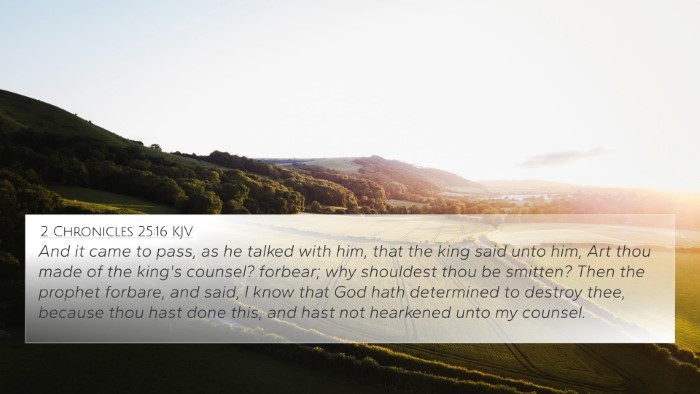Understanding Jeremiah 43:4
Verse: "So Johanan the son of Kareah, and all the captains of the forces, and all the people, obeyed not the voice of the Lord, to dwell in the land of Judah." (Jeremiah 43:4)
Meaning and Interpretation
The verse reflects a pivotal moment in the book of Jeremiah, emphasizing the disobedience of Johanan and others who chose not to heed God’s commandments. This account serves as a warning and an illustration of the human tendency to rely on personal decisions over divine guidance.
Key Insights from Commentaries
- Matthew Henry: He emphasizes that true faith is not merely listening to God's voice but also acting according to it. The refusal of Johanan and his captains showcases a lack of faith and the consequences that will follow their rebellious choice.
- Albert Barnes: Barnes points out that this disobedience occurs against a backdrop of fear and uncertainty. Johanan represents those who, despite receiving guidance from God, chose to act on their own judgment, indicating a profound distrust in God's plan for their safety.
- Adam Clarke: Clarke underlines the significance of the collective choice made by the captains and the people, stressing that such communal disobedience can lead to dire consequences, as seen later in history where those who fled to Egypt faced God's wrath.
Thematic Connections
This verse links to various themes prevalent throughout the Bible, showcasing the importance of obedience to God's word, the consequences of choosing human wisdom over divine instruction, and the call for faithfulness among believers.
Cross-References
- Isaiah 30:1: This verse condemns those who seek counsel but not from God, echoing the sentiment found in Jeremiah 43:4 about disobedience to divine will.
- Hebrews 3:18-19: These verses warn about the dangers of unbelief and disobedience like that shown by Johanan and his followers.
- Jeremiah 42:18: A preceding context that illustrates God’s warning to the remnant about the dangers in Egypt, emphasizing the importance of divine obedience.
- Proverbs 3:5-6: Offers wisdom on trusting the Lord rather than relying on one’s understanding, which aligns with the lessons in Jeremiah 43:4.
- Matthew 7:24-27: The parable of the wise and foolish builders parallels the theme of acting on Christ’s teachings versus disobedience.
- Romans 1:21: Highlights the principle of knowing God yet choosing not to honor Him, a theme reflected in Jeremiah's narrative.
- 1 Samuel 15:23: Discusses the relationship between rebellion and witchcraft, highlighting that disobedience is akin to rejecting God's authority.
The Importance of Cross-Referencing
Understanding the correlations between verses enriches one’s study. For those searching for Bible verse cross-references, tools such as a Bible concordance or a cross-reference Bible study can help identify these connections.
How to Use Cross-References
Effective methods include:
- Looking for similar themes across different books.
- Identifying parallels in the narrative and teachings.
- Using a Bible cross-reference system to find related verses.
Conclusion
The cautionary tale found in Jeremiah 43:4 stands as a vital reminder of the necessity of faithfulness and obedience to God’s guidance. Such themes resonate throughout scripture and serve as a foundational principle for believers.








